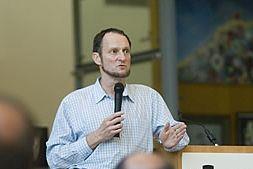
PMA Australia/New Zealand hosted its annual ‘Fresh Event' conference from 9-12 June at the Melbourne Convention and Exhibition Centre, with sustainability, traceability, food safety and pleasing the evolving consumer emerging as the key challenges facing the industry.
The conference proper kicked off on 10 June with an opening address from PMA Australia/New Zealand chairman Michael Simonetta.
Then Brian Silbermann, president and CEO of PMA USA took to the stage to address the 735 delegates in attendance, and said the conference attendance figures highlighted how important PMA Australia/New Zealand had become since its inception in October 2009.
Mr Silbermann said key themes which would be addressed throughout the event were the need for the fresh produce industry to embrace change, to make meaningful business connections and to maintain the highest vigilance in food safety.
The conference's first plenary session offered a forum for retailers under the title ‘The changing landscape of the retail sector in Australasia over the next decade'. Presentations were heard from Costco Australia managing director Patrick Noone, IGA Fresh CEO Harry Rumpler and Franklin's general manager Stan Srage.
Mr Noone offered a brief overview of Costco's bulk buy business model, noting the ‘bigger is better' innovation his company had made since its formation in the US in 1983.
IGA Fresh's Harry Rumpler then gave an informative presentation which made note of the disparity between meat advertising and fresh produce advertising in Australia, claiming meat advertising to be double that of fruit and vegetables.
Mr Rumpler identified industry sustainability, food safety and traceability as key issues to be addressed by producers and retailers.
The conference's next plenary session was entitled ‘top 10 characteristics of a preferred supplier to local and international retailers', and the speakers were Woolworths director of supermarkets Greg Foran, Tesco's Johnathan Sutton and Jackie McArthur from McDonalds Australia.
After this session, the conference then broke into several concurrent presentations and delegates could choose which one to attend.
Three speakers tackled the difficult question of ‘Is our industry part of the CO2 emissions problem or a solution?'
Graeme Anderson from the Victorian Department of Primary Industries presented some disturbing statistics on climate change.
'The last decade has been consistently warm, and the race favourite is a warmer decade again,' Mr Anderson said.
He pointed to policy responses the government was putting in place to try and counteract the threats posed, listing an Emissions Trading Scheme, renewable energy targets and the exceptional circumstances review of the water industry as areas where progress was possible.
'When the price of oil is expensive, people become more efficient with how they use it. That's the main game for governments and corporations,' he said.
Allison Clarke from Tasmanian vegetable grower Houston's Farm then explained how lowering food miles could have enormous impacts on carbon emissions, and showed how the enforced relocation of the company's distribution centre to Queensland had meant huge reductions in the firm's carbon output.
Day two of the conference was geared towards providing delegates with strategies to enhance their own business models and improve competitiveness.
The day began with a bang as two Australian Air Force pilots explained how to use their methodology to execute business strategies, before Enza/T&G's Terry Brown and Visy's Anthony Mackay showcased successful strategies in business. Mr Brown's presentation on the way Enza has marketed the Jazz apple both at home and internationally was particularly interesting.
Later in the day, at a session entitled ‘successful factors in profitable marketing variety of proprietary varieties', Coregeo Australia's Jon Durham took delegates through the highly successful branding of the Pink Lady apple, and how this has translated into global sales figures of around A$1.4-1.6bn annually.
Afternoons were spent wandering the event's trade show, where 58 companies and organisations across all branches of the fresh produce sector had set up presentations to showcase their wares.






No comments yet